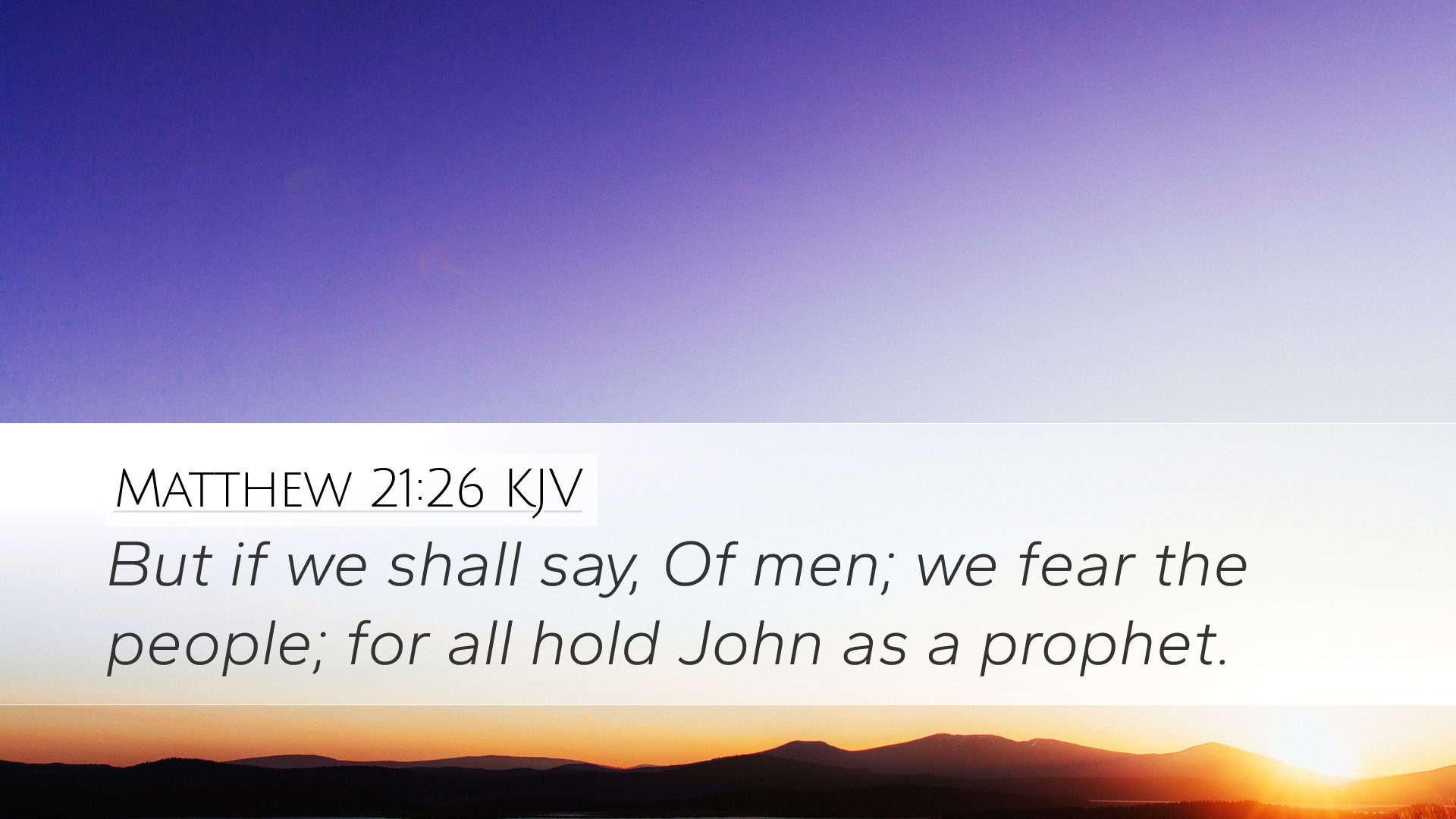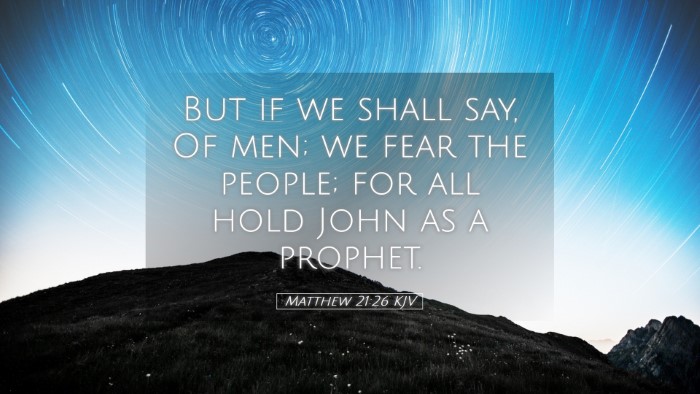Commentary on Matthew 21:26
Verse: “But if we say, ‘From men,’ we fear the multitude; for all hold John as a prophet.”
Introduction
This verse plays a crucial role in the narrative surrounding the authority of Jesus, highlighting the public's perception of John the Baptist and the religious leaders' apprehension in addressing such perceptions. In this commentary, we will explore the implications of this verse and provide insights from various public domain commentaries.
Contextual Background
Matthew 21 recounts the events leading up to Jesus' authority being questioned by the chief priests and elders as He teaches in the temple. The question they pose is aimed at undermining His authority and finding grounds for accusing Him. The mention of John the Baptist is significant, as it reflects the tension between Jesus and the religious leaders of the day.
Analysis from Public Domain Commentaries
1. Matthew Henry's Commentary
Henry emphasizes the dilemma faced by the religious leaders: they are situated between the truth and public opinion. He notes that their fear of the people’s reaction leads them to avoid giving a direct answer. The mention of John as a prophet indicates the respect he held among the people, and the leaders' refusal to acknowledge this reality speaks to their own insecurity and lack of genuine authority.
2. Albert Barnes' Notes on the Bible
Barnes elaborates on the motives behind the leaders' tactics. He highlights that their refusal to acknowledge John's authority stems not from ignorance but from a calculated move to protect their own positions. They recognize that to declare John’s ministry as mere human invention would provoke the people who revered John and might lead to civil unrest. Barnes points out the irony of the religious elite being bound by public opinion when their role should have been to lead with integrity and truth.
3. Adam Clarke's Commentary
Clarke provides an exhaustive interpretation of the term “prophet.” He notes that acknowledging John as a prophet implicates them in recognizing John's endorsement of Jesus. Clarke discusses the depth of their fear, illuminating how it stems from a lack of conviction alongside a fear of backlash from the multitude who had been influenced by John’s ministry. The leaders’ entrapment is indicative of a spiritual blindness that corrupts their understanding and keeps them politically astute but theologically deficient.
Theological Implications
This verse invites deeper consideration regarding the relationship between truth and authority, as well as the dynamics of public opinion in religious matters.
- Authority and Fear: The fear of man can lead individuals or leaders to abandon the truth. The reluctance of the chief priests illustrates a broader principle in theological discourse, where the fear of losing influence can silence the voice of truth.
- Public Perception: It raises important questions for leaders today about how public perception influences their teaching and action. The legitimacy coming from popular opinion must be weighed against the clear mandates of Scripture.
- Prophetic Voice: The acknowledgment of John as a prophet reinforces the prophetic tradition in Israel, reminding modern readers of the importance of recognizing and valuing those who speak for God, even when their messages challenge established norms.
Practical Applications
For pastors and Bible scholars, Matthew 21:26 serves as a potent reminder of the challenges involved in asserting biblical truth in the face of public opinion. The fear that gripped the religious leaders should encourage current leaders to be courageous in proclaiming the truths of the Gospel, even amidst potential backlash. Here are some applications:
- Integrity in Leadership: Leaders should strive for authentic integrity, always prioritizing the truth of God’s Word over the fluctuating opinions of people.
- Courage to Speak: Like John the Baptist, those called to proclaim God’s message must be willing to face opposition, knowing that faithfulness to God is paramount.
- Discernment: Believers are encouraged to discern between human wisdom and divine revelation, ensuring that their beliefs and actions align with Scripture irrespective of societal pressure.
Conclusion
In summary, Matthew 21:26 challenges both religious leaders and lay believers to consider the costs of truth-telling. The interplay between public opinion and the call to proclaim God’s truth is a timeless theme that resonates within the Church. As we reflect on this text, may we find the courage to uphold biblical truths, recognizing the example set by John and the calling extended by Christ.


